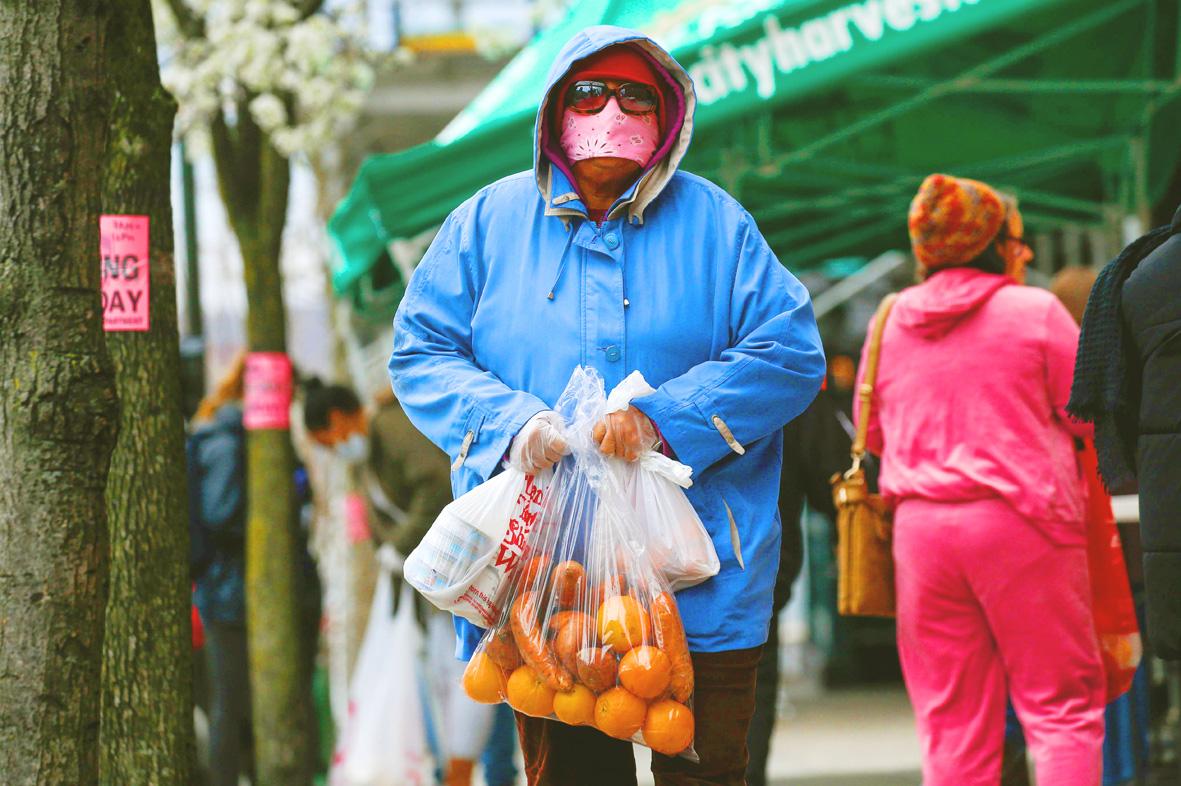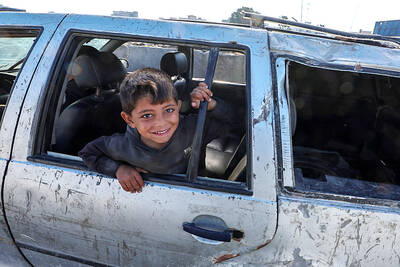New York food banks have become inundated with newcomers deprived of income since the near-total halt of business in the city.
Sacks of oranges, sweet potatoes and onions are spread over three tables at an open-air market in Washington Heights, a neighborhood in the north of Manhattan. Sterilized milk and cans of tuna and salmon cover three others. Hundreds of people came over the weekend to restock at the distribution center, one of many run by City Harvest, a major New York-based charity.
There are no long lines reminiscent of the soup kitchens of the 1930s. Instead, people trickle in, often wearing masks for protection and keeping their distance from each other under the direction of market volunteers.

Photo: AFP
Among the customers is Lina Alba, 40, a single mother with five children aged 11 to 23. She worked as a maid in a Manhattan hotel until it closed two weeks ago.
Her two oldest children also lost their jobs.
“It is my first time,” she said. “We need the help now. This is crazy. So we don’t know what’s gonna happen in a few weeks.”
She’s trying to stay positive, though.
“At least I’m spending time with my kids... I am the teacher, I am the mom — I am everything,” she said. “We are alive, we are healthy, we just need to pray.”
It took the single mother a week to register for unemployment as the service flooded. The benefits should start arriving in three weeks.
Alba also hopes to receive at least US$1,200 from the federal government, thanks to a historic aid package passed last week by the US Congress.
“It’s not gonna be enough,” but “you’re gonna appreciate anything right now,” she said, adding that “a lot of people” need help.
Jose Neri, 51, is one of many Hispanic employees who worked in now-closed New York restaurants. He also came to a food bank for the first time. There are five people in his family.
“We’re using our savings to survive,” he said in Spanish, wearing a mask and gloves. “We’ve got what we need to hold it together for now.”
City Harvest employee Geraldine Fermin has heard stories like this a lot since most New York City business closed down two weeks ago.
“It’s heartbreaking that it has to be like that for a lot of people,” Fermin said. “People that were poor are now poorer, and people that had decent jobs, that could get by, now are poor too.”
“Before, there were 1.2 million people in New York who needed help for food. Now, there are three times as many, that’s more than 3 million New Yorkers,” City Harvest vice president Eric Ripert said.
Speaking in French, Ripert said that City Harvest, which also supplies food to about 400 homeless shelters, does not currently have any supply problems.
However, it needs funds to buy more food and is teaming up with other organizations to create a united front against “a situation that will get worse.”
“We got through Sept. 11, the great recession of 2008-2009, we got through a lot of things, but none of that is comparable to this catastrophe we’re living through,” he said.

MONEY GRAB: People were rushing to collect bills scattered on the ground after the plane transporting money crashed, which an official said hindered rescue efforts A cargo plane carrying money on Friday crashed near Bolivia’s capital, damaging about a dozen vehicles on highway, scattering bills on the ground and leaving at least 15 people dead and others injured, an official said. Bolivian Minister of Defense Marcelo Salinas said the Hercules C-130 plane was transporting newly printed Bolivian currency when it “landed and veered off the runway” at an airport in El Alto, a city adjacent to La Paz, before ending up in a nearby field. Firefighters managed to put out the flames that engulfed the aircraft. Fire chief Pavel Tovar said at least 15 people died, but

LIKE FATHER, LIKE DAUGHTER: By showing Ju-ae’s ability to handle a weapon, the photos ‘suggest she is indeed receiving training as a successor,’ an academic said North Korea on Saturday released a rare image of leader Kim Jong-un’s teenage daughter firing a rifle at a shooting range, adding to speculation that she is being groomed as his successor. Kim’s daughter, Ju-ae, has long been seen as the next in line to rule the secretive, nuclear-armed state, and took part in a string of recent high-profile outings, including last week’s military parade marking the closing stages of North Korea’s key party congress. Pyongyang’s official Korean Central News Agency (KCNA) released a photo of Ju-ae shooting a rifle at an outdoor shooting range, peering through a rifle scope

South Korea would soon no longer be one of the few countries where Google Maps does not work properly, after its security-conscious government reversed a two-decade stance to approve the export of high-precision map data to overseas servers. The approval was made “on the condition that strict security requirements are met,” the South Korean Ministry of Land, Infrastructure and Transport said. Those conditions include blurring military and other sensitive security-related facilities, as well as restricting longitude and latitude coordinates for South Korean territory on products such as Google Maps and Google Earth, it said. The decision is expected to hurt Naver and Kakao

Gaza is rapidly running out of its limited fuel supply and stocks of food staples might become tight, officials said, after Israel blocked the entry of fuel and goods into the war-shattered territory, citing fighting with Iran. The Israeli military closed all Gaza border crossings on Saturday after announcing airstrikes on Iran carried out jointly with the US. Israeli authorities late on Monday night said that they would reopen the Kerem Shalom crossing from Israel to Gaza yesterday, for “gradual entry of humanitarian aid” into the strip, without saying how much. Israeli authorities previously said the crossings could not be operated safely during